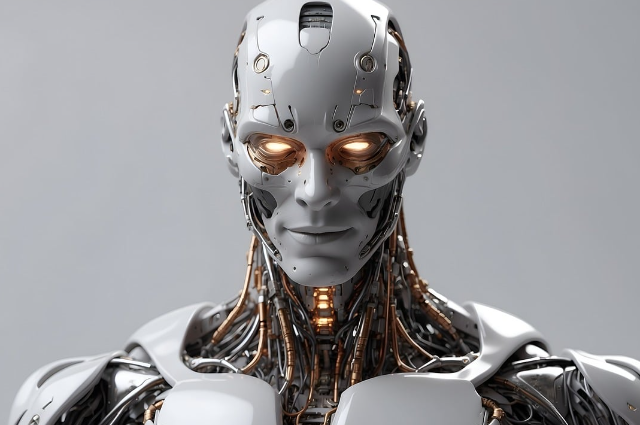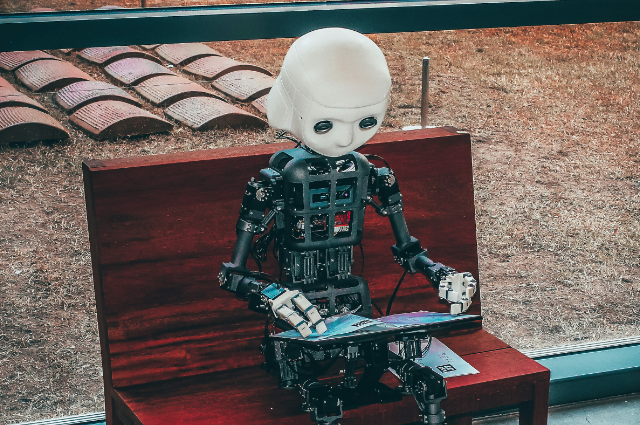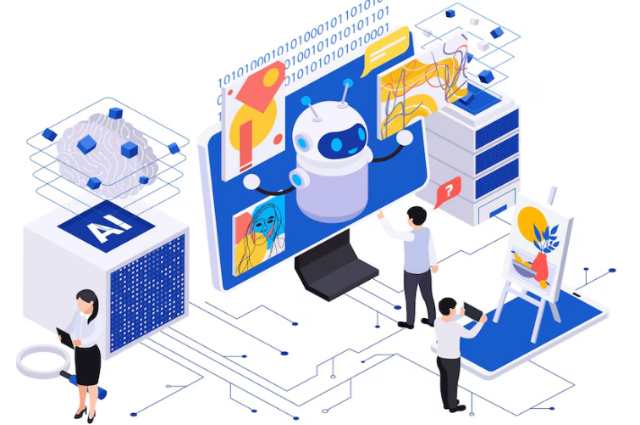
Image by Gerd Altmann from Pixabay
Recent advancements in artificial intelligence (AI), robotics, and the Internet of Things are directing in a new era of automation. This period is often referred to as Industry 4.0, characterised by the integration of AI-driven technologies, robotics, and computers that can perform not only routine tasks but also complex activities previously thought to require human intelligence such as decision-making and judgement.
The Impact of AI on Employment
AI is controlled to affect jobs in three significant ways:
- Complementing Human Work: In some cases, AI can assist humans by taking over repetitive or everyday tasks by allowing workers to focus on more strategic and creative responsibilities.
- Replacing Human Roles: There are certain tasks where AI may completely replace human workers. This could include jobs that involve predictable and routine functions, making them ideal candidates for automation.
- Creating New Job Opportunities: Interestingly, while AI may eliminate some positions, it also has the potential to create entirely new types of jobs that did not exist before. These roles may require new skills and expertise by reflecting the evolving job market.
Understanding the Effects in India
Given this backdrop, it is crucial to assess how these technological advancements will impact employment and job opportunities in India. This policy brief aims to provide a comprehensive overview by examining both national and global studies related to the effects of AI on jobs, specifically in the Indian context.
A Path Forward
Ultimately, this policy brief seeks to outline actionable recommendations for policymakers. By understanding the implications of AI on the workforce the stakeholders can better prepare for the changes ahead and ensure that both workers and industries can adapt effectively in this rapidly evolving landscape.
What exactly is artificial intelligence?
Artificial Intelligence (AI) refers to machine-based systems that are capable of making predictions, recommendations or decisions all based on specific objectives set by humans. These systems operate in both real and virtual environments and are expected to have a major influence on labour markets, workers, and workplaces. Due to these shifts, both businesses and employees will have to adapt to significant changes and transitions. In recent years, AI technologies have advanced rapidly, particularly in areas like image recognition, text processing, speech recognition, computer programming and predictive analytics.
Fears and Opportunities in the Workforce
The growth of AI has led to fears about widespread job losses as AI increasingly automates not just routine tasks but also complex, non-repetitive ones. This capability has sparked concern that AI could impact every sector of the economy. However, AI does not only pose threats; it also offers opportunities. New jobs and tasks will be created while existing roles may evolve. Some tasks will become safer and less monotonous by reducing manual effort. On the flip side, there is a danger that certain roles might lose their human touch, potentially leading to a dehumanization of work and a loss of skills for some workers.
The Inequality Risk in AI Adoption
One significant concern with the spread of AI is the inequality it may introduce in the labour market. Workers and companies with the ability to adapt quickly to these technologies could reap more benefits while those who struggle with the transition might be left behind. This risk is not entirely new but AI is expected to intensify it. Those who find it difficult to keep up with technological changes could face exclusion from the workforce. As AI becomes more integrated into economic activities, it could widen the gap between the privileged and underprivileged and potentially increasing social and economic disparities.
Autonomous Decision-Making and Ethical Concerns
Another pressing issue is the role of AI in decision-making within the workplace, especially in human resources and management processes. The use of AI in tracking employees whether they are delivery drivers or healthcare professionals like nurses as well as in recruitment and performance monitoring can alter the dynamic between employers and workers. It also raises critical ethical questions. For instance, decisions made by AI systems could be biased and that will lead to discrimination and unfair treatment. Additionally, AI technologies that process biometric data, employ facial recognition or even detect emotions and behaviours pose a serious risk to privacy and human dignity. These systems can potentially lead to excessive surveillance and which will be infringing on workers' rights and raising concerns about data protection.
AI's Positive Potential for Job Creation and Productivity
While AI poses significant challenges, it also offers vast opportunities. The technology can help create new business models and new jobs, even reshape the structure of existing roles. Since, AI can enhance and complement human skills as it could lead to increased productivity, a higher demand for human labour and improved job quality.
Like any other technological advancement, AI brings both risks and benefits. However, experts suggest that the impact of AI on labour markets could be more pronounced due to its rapid development and potential for widespread application across various sectors and occupations. Additionally, the introduction of AI into workplaces might further intensify existing imbalances in power and opportunities between different groups by making it crucial to address the accompanying challenges thoughtfully.
The Impact of AI on Various Job Sectors
Artificial Intelligence (AI) is increasingly shaping the future of numerous industries by fundamentally altering how businesses operate. As companies adopt AI technologies, certain jobs are being reshaped while others may face reductions. Below is a detailed look at how AI is transforming three key sectors: finance and banking, media and marketing and legal services.
Finance and Banking: Automation and Job Transformation
The finance sector is rapidly integrating AI into its daily operations. A significant percentage of banks are already making use of AI with 56% reporting that they have applied it in various business domains such as management and 52% using it to generate revenue, according to data from the Cambridge Centre for Alternative Finance and the World Economic Forum.
One notable example is Capital One where Abhijit Bose, a senior vice president, emphasized that AI could revolutionize financial advice by monitoring transactions to provide more personalized saving and spending guidance. Additionally, financial firms like Morgan Stanley are using AI tools, such as OpenAI-powered chatbots to streamline wealth management processes. These chatbots enable financial advisors to efficiently retrieve data and research, thus improving the overall client experience.
Looking forward, the World Economic Forum predicts that AI will have three key impacts on the finance industry: reducing the number of jobs, creating new positions, and boosting operational efficiency. By 2027, they expect that approximately 23% of jobs in China’s financial sector will be replaced by AI-driven technologies.
Media and Marketing: AI’s Growing Role in Content Creation
The media and marketing industries are also experiencing significant changes due to the rise of AI. Kristian Hammond, chief scientist of Natural Sciences made a bold prediction to the BBC by stating that within 15 years, “90% of news will be written by machines.” This shift is already in progress with tools like Natural Sciences' Quill software, which helps generate company reports ahead of earnings announcements.

Image by Franz Bachinger from Pixabay
German publisher Axel Springer is another example, as the company recently announced plans to transition to a “digital-only” model, resulting in job cuts in favour of automation and advanced technologies. In the United States, reporters from outlets like Business Insider, CNET, and CNBC have experimented with ChatGPT to write news stories and some of these AI-generated articles have faced criticism for inaccuracies.
BuzzFeed CEO Jonah Peretti also revealed that his company will rely more on AI, particularly ChatGPT, to create personalized content and improve quizzes which is a move that did not sit well with employees. In the marketing world, the integration of AI has been swift with Salesforce reporting that 84% of marketers were using AI tools by 2020 which is a sharp increase from 29% in 2019. Marketing teams with higher performance levels are now utilizing multiple AI and machine learning tools to optimize their strategies and plan to continue expanding their use in the coming years.
Legal Services & Regulatory: Enhancing Access to Justice

Photo by Scott Graham on Unsplash
AI is self-assured to bring substantial changes to the legal sector as well. Recently, an attorney utilized ChatGPT to publish a 14-page legal paper by showcasing the AI's ability to perform tasks such as contract creation, generating legal questions for depositions and analysing complex legal decisions. According to Andrew Perlman, a Dean at Suffolk University Law School and author of the paper had sai that , “AI has the potential to address the issue of unequal access to legal services, particularly for low-income individuals”. A 2022 report by the Legal Services Corporation revealed that 92% of civil legal problems faced by low-income Americans either receive insufficient help or go entirely unresolved. AI could bridge this gap by making legal assistance more affordable and accessible.
Companies are already starting to explore these possibilities. For instance, the startup Lawgeex has developed an AI service that can review contracts faster and according to the company, more accurately than human lawyers. This represents a potential shift in how legal work is conducted with AI taking over routine tasks, freeing lawyers to focus on more complex issues.
The growing use of AI in industries such as finance, media, marketing, and legal services signals a shift toward greater efficiency and job transformation and in some cases, there will be job reduction. While some roles may be lost due to automation but new opportunities will emerge as AI tools improve and expand. For businesses, the challenge lies in balancing the benefits of AI with its potential to disrupt traditional employment. For workers, adaptation and learning new skills will be essential to thrive in this changing landscape.
The Overall Impact of Artificial Intelligence
Artificial intelligence (AI) is transforming the way we work and its influence is expected to increase significantly in the coming years. Rather than simply taking over jobs, AI is intended to enhance human capabilities and serve as a supportive tool as explained by Ruchee Anand, Senior Director of Talent and Learning Solutions at LinkedIn India.
The Current State of AI
AI is still in its early stages of development and according to Sumit Sabharwal, Head of HRSS at Fujitsu International Regions, the negative consequences have been minimal so far. This suggests that while AI is making strides in various sectors and it has not yet caused widespread disruption in the job market.
AI's Influence on Employment in India
The impact of AI on employment in India has been notable. As highlighted by Jaideep Kewalramani, COO and Head of Employability at TeamLease Edtech, AI has automated numerous tasks across different industries. This automation has led to job displacement in some areas but has also opened up new career opportunities in fields related to AI technology.
Concerns Among Job Seekers

Photo by The Jopwell Collection on Unsplash
Despite these developments, many job seekers in India express concerns about the future. Sashi Kumar, Head of Sales at Indeed India has pointed out that there are significant worries regarding the need for reskilling or upskilling to keep pace with technological advancements. Additionally, individuals fear potential job losses due to automation and are increasingly aware of the ethical implications surrounding AI's integration into the workforce.
While AI presents exciting opportunities for enhancing productivity and creating new jobs, it also raises important questions about workforce readiness and ethical considerations that must be addressed as we move forward into this new era.
The Impact of AI and Digital Interventions on Jobs in India : AI-Driven Job Transformation by 2025
The Ministry of Electronics and Information Technology (MeitY) in 2019 predicted that by 2025, digital innovations including artificial intelligence (AI) will significantly impact India's workforce. Through retraining and upskilling, approximately 40-45 million workers are expected to be redeployed into new roles. In addition, these advancements will create around 20 million new jobs, particularly in key sectors such as Information Technology and Business Process Management (IT-BPM), manufacturing, agriculture, transport, and logistics.
Positive Outlook on AI’s Role in the Workplace
A study conducted by Microsoft and IDC in 2019 surveyed 200 business leaders and 202 workers across diverse industries in India including healthcare, agriculture, manufacturing and retail. The findings revealed a generally optimistic view of AI's effect on jobs. Over half of both business leaders (64%) and workers (63%) believe that AI will either improve their current job functions or reduce repetitive tasks. However, opinions diverged when it came to job creation or replacement. While 16% of business leaders believed AI would generate new jobs, 18% thought it would replace some workers. Interestingly, only 4% of workers feared job replacement and 21% were hopeful that AI would create more opportunities.
AI’s Economic Potential in India
According to a 2020 report from NASSCOM, AI and data technologies could add between USD 450-500 billion to India's Gross Domestic Product (GDP) by 2025. Nearly 45% of this value is projected to come from three key sectors: consumer goods and retail, agriculture, and banking and insurance. Other sectors likely to benefit include telecommunications, media, IT, energy, transportation, and healthcare. Though the report did not directly address the impact of AI on employment but it emphasized the growing demand for specialized roles like data scientists and engineers. These positions are critical for filling gaps in the AI workforce.
Productivity Growth and Job Impact of AI
In 2020, the Indian Council for Research on International Economic Relations (ICRIER) conducted an econometric study, which found a strong and positive relationship between firms using AI and growth in Total Factor Productivity (TFP). The study suggested that a 1% increase in AI intensity within firms could boost TFP growth by 0.05%, adding USD 67.25 billion or 2.5% of GDP to the economy. Although the study acknowledged that AI might replace some routine and non-cognitive tasks, it predicted that the overall effect would be job creation in the medium to long term. It also pointed out the rise of data annotation and labelling companies in India by presenting an opportunity for high-school graduates to gain employment in tasks that require minimal training.
Specific Roles at Risk of Automation
The ICRIER report also outlined sectors likely to face the most significant impacts from AI, including financial services, manufacturing, transportation, and shipping. The roles most vulnerable to AI-driven automation include data entry clerks, cashiers, financial analysts, telemarketers, and customer service representatives. However, while some roles may be replaced, others are likely to emerge, reflecting AI's ability to transform, rather than eliminate, employment opportunities.
Expectations for AI and Workforce Growth
Intel’s 2020 report, based on two surveys, echoed these findings. The first survey called the Suitability of Machine Learning (SML) Survey, assessed 3,099 employees across 106 different occupations in India to determine how compatible their roles were with machine learning. The second survey, AI and the Future of Work surveyed 301 firms that had integrated AI and machine learning into their operations. The results were encouraging as more than 70% of respondents expected their organizational workforce to grow in response to AI implementation over the next two years.
AI and digital technologies are set to reshape India's workforce landscape. While there are concerns about job displacement, the overall outlook suggests that AI will create new opportunities especially in sectors such as IT, manufacturing and logistics. With proper training and role definitions, India's labour force can benefit from these technological advancements by contributing to both job creation and economic growth.
Preparing for the AI Era: The Importance of Skill Development
As we move into an age dominated by artificial intelligence (AI), it is crucial for job candidates to enhance their skill sets to effectively utilize AI tools and boost their productivity. According to Sridharan, updating skills not only helps individuals make the most of AI technologies but also aligns their abilities with market demands by increasing their chances of securing jobs and earning higher salaries.
Essential Skills for the Future
To thrive in this new environment, candidates should focus on acquiring specific skills related to AI. Jaideep Kewalramani suggests that learning programming, machine learning, data analytics, data science, and prompt engineering will be beneficial. These skills are becoming increasingly important as industries integrate AI into their operations.
The Role of Soft Skills
However, it’s important to note that technical skills are not the only focus area. Ruchee Anand from LinkedIn emphasizes that many professionals, particularly Millennials and Generation X, are dedicating time to developing soft skills. These include Personal Effectiveness, Personal Development, Leadership, and Management. Such skills are essential for navigating the complexities of modern workplaces and collaborating effectively with others.
New Opportunities Amid Job Displacement
As AI continues to advance, it will not only lead to the elimination of certain jobs but also pave the way for new roles in areas like AI development, maintenance, and oversight. Siva Prasad Nanduri, CEO of Diensten Tech Ltd (DTL) pointed out that while some positions may become obsolete, the growth of AI technology will create a demand for skilled professionals who can manage and innovate within this field.
Preparing for the AI age requires a balanced approach that combines both technical and soft skills. By investing in their development now, candidates can position themselves for success in a rapidly changing job market filled with new opportunities.
AI's Role in Boosting Workplace Productivity
Artificial intelligence (AI) is revolutionizing the way businesses operate, particularly when it comes to improving workplace productivity. One key area where AI is making a significant difference is in helping skilled workers become more efficient. A recent study, conducted by a diverse team of researchers that involved over 700 consultants, sheds light on the remarkable benefits of AI in professional settings. The study reveals that when AI is used appropriately then it can boost a worker’s productivity by up to 40% compared to those who do not use it. This productivity surge comes from AI’s ability to handle routine, repetitive tasks, allowing skilled workers to focus on more challenging and important work.
The Importance of Using AI Within Its Limits
While the advantages of AI are clear, it's essential to understand its limitations. The same study emphasized that the effectiveness of AI largely depends on how it's applied. When AI is used outside of its ideal scope—meaning for tasks it wasn’t designed to handle—workers’ performance can actually suffer. In fact, the research found that using AI incorrectly resulted in a 19% decrease in performance. This serves as a reminder that AI is not a one-size-fits-all solution and needs to be tailored to specific tasks to be effective.
AI’s Effect on Different Skill Levels
Interestingly, the study highlighted the varying impact AI has on workers with different skill sets. For those in the lower half of the skill spectrum, AI tools such as GPT-4 provided a notable 43% boost in performance. In contrast, workers in the top half of the skill range saw a more modest improvement of 17%. This suggests that AI can help close the gap between less and more skilled workers, offering greater benefits to those who may need more assistance in their roles.
AI's Role in Enhancing Cognitive Processes
Another crucial insight from the study is AI's impact on cognitive processes and decision-making. Even when AI is applied to tasks outside its optimal range that are leading to a decrease in performance, it still has a positive influence on the quality of workers’ reasoning and justification. This suggests that AI can contribute to enhancing workers' cognitive abilities and improve how they approach problem-solving even if it doesn’t directly result in better task completion.
Strategic Integration of AI in the Workplace

Photo by Andrea De Santis on Unsplash
Given these findings, organizations should approach AI integration thoughtfully. Managers and business leaders must consider how best to incorporate AI into their employees' workflows. This involves designing user-friendly interfaces by offering proper onboarding to employees redefining job roles to accommodate AI and fostering a workplace culture that encourages accountability. By strategically integrating AI, companies can ensure that it serves as a tool for enhancing rather than delaying employee productivity.
AI holds tremendous potential for boosting productivity in the workplace, but only when used effectively and within its limitations. The key to success lies in thoughtful implementation and understanding how AI can complement human skills.
Conclusion
Artificial Intelligence (AI) has the potential to revolutionize industries and economies worldwide. India with its large and growing population is uniquely positioned to benefit from AI-driven growth. However, the integration of AI into the Indian workforce also presents challenges and risks. While AI can automate tasks and improve efficiency, it can also lead to job displacement in certain sectors. The key to realizing the full potential of AI lies in striking a balance between these two aspects.
Investing in Human Capital - To ensure a smooth transition to an AI-driven economy, India must invest heavily in upskilling and reskilling its workforce. Initiatives like NASSCOM's Future Skills program are crucial in equipping professionals with the necessary AI skills.
The success of such initiatives depends on a collaborative effort between the government, industry, and academia. By working together, these stakeholders can develop tailored training programs that address the specific needs of different sectors.
To prepare the next generation for an AI-dominated future, it is essential to incorporate AI education into the school curriculum. This will equip students with the knowledge and skills needed to thrive in a rapidly changing technological landscape.
The Indian government has launched several initiatives to promote skill development and create job opportunities. These include:
- Pradhan Mantri Kaushal Vikas Yojana (PMKVY): A flagship program which is aimed at providing vocational training to millions of youth.
- Jan Shikshan Sansthan (JSS): Offers vocational training to non-literates, neo-literates, and school dropouts in rural areas.
- National Apprenticeship Promotion Scheme-2 (NAPS-2): Promotes apprenticeship training to bridge the gap between education and employment.
- Craftsman Training Scheme (CTS): Provides long-term training through Industrial Training Institutes (ITIs).
By leveraging these initiatives and embracing AI, India can create a more inclusive and prosperous economy for its citizens. The key is to approach AI with a strategic mindset, focusing on human development and job creation rather than simply automation.
. . .
References:
- https://www.livemint.com/ai/artificial-intelligence
- https://www.whitehouse.gov/wp-content
- https://www.theglobaldeal.com/news
- https://www.linqto.com/blog/how-is-artificial-intelligence
- https://www.upwork.com/resources/ai-job-market-impact
- https://www.mastercard.com/news/perspectives
- https://projects.worldbank.org/en/results/2023
- https://www.investindia.gov.in/team-india


